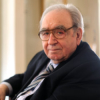Robert Fogel

Robert Fogel
Robert William Fogelwas an American economic historian and scientist, and winnerof the 1993 Nobel Memorial Prize in Economic Sciences. As of his death, he was the Charles R. Walgreen Distinguished Service Professor of American Institutions and director of the Center for Population Economics at the University of Chicago's Booth School of Business. He is best known as an advocate of new economic history– the use of quantitative methods in history...
NationalityAmerican
ProfessionHistorian
Date of Birth1 July 1926
CountryUnited States of America
I was born in New York City in 1926, four years after my parents and my brother migrated to the United States from the city of Odessa in Russia.
My education in the public schools of New York City between 1932 and 1944 was an excellent preparation for a life in science. Because of the Depression, these schools were able to attract a remarkably talented and dedicated collection of teachers who encouraged their students to strive for the highest levels of accomplishment.
People want more and more leisure time, which means the freedom to do what they want to do, not what they have to do, and as we get richer and richer, more and more people will be able to afford that.
Remember, what does 'retirement' mean? It doesn't mean that you're a couch potato. Leisure is not the same thing as rest. If you're bicycling five miles a day, that's leisure, but it certainly takes a lot of effort.
No individual has done more to help me pursue a career in science than my wife of forty-five years. I met Enid Cassandra Morgan during the election campaign of 1948 when she was a Sunday school teacher, a leader of the youth organizations of St. Phillips Episcopal Church, and the head of Harlem Youth for the election of Henry Wallace.
As we get rich, the basics of life - food, clothing and shelter - become a very small part of total expenditure. And people have enough money to purchase things that enhance them spiritually, and I mean the word 'spiritual' not necessarily in a religious sense but in the sense that it adds to your feeling of well-being.
Among the current discussions, the impact of new and sophisticated methods in the study of the past occupies an important place. The new 'scientific' or 'cliometric' history-born of the marriage contracted between historical problems and advanced statistical analysis, with economic theory as bridesmaid and the computer as best man-has made tremendous advances in the last generation.
In 1890, nearly everyone died on the job, and if they lived long enough not to die on the job, the average age of retirement was 85.
In most, if not quite all, parts of the world, the size, shape and longevity of the human body have changed more substantially, and much more rapidly, during the past three centuries than over many previous millennia.
The rate of technological and human physiological change in the 20th century has been remarkable. Beyond that, a synergy between the improved technology and physiology is more than the simple addition of the two.
The president has very little effect on the economy. If you want to put blame or credit, the main person who influences the business cycle is the head of the Federal Reserve Bank.
The older I get, the more important my view of the family is.